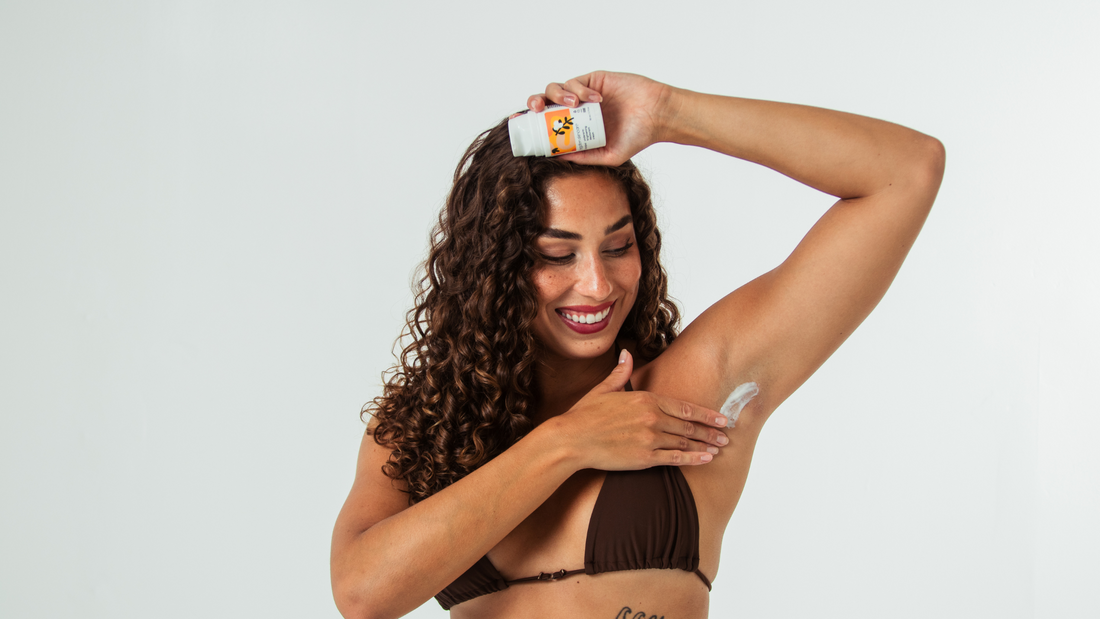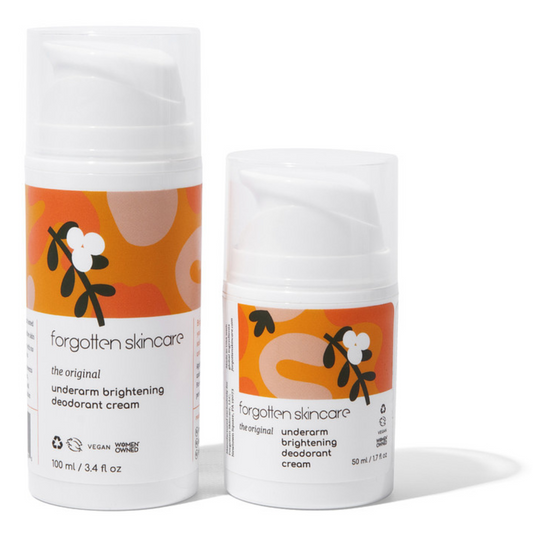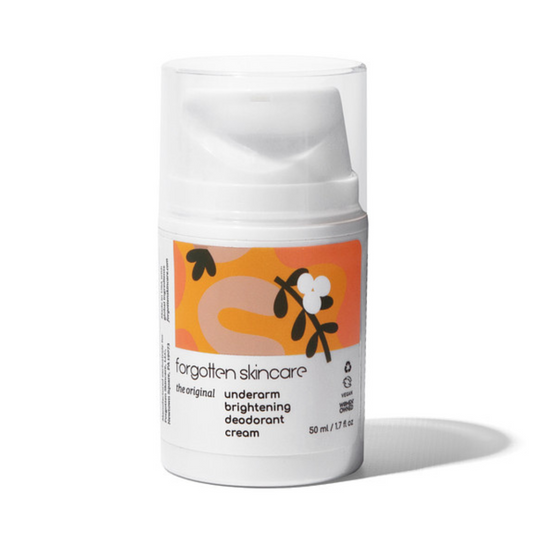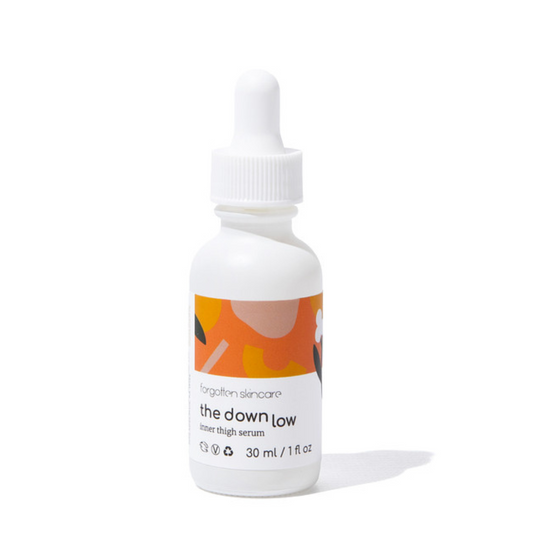
Body Odor 101: What Causes It & How to Stay Fresh
Ever feel a little… musty? You’re not alone. Body odor — (not so) affectionately known as BO — is completely natural, yet wildly annoying.
At Forgotten Skincare, we spend our time getting to know the less-than-sexy skincare issues, so you don’t have to. And guess what? That includes your underarms! We’ve done a deep dive into the science behind body odor, so you can skip the secret sniffing.
Read on to learn more about what causes BO, your unique underarm skin, and ways that you can manage body odor… High five!
What is body odor?
Body odor, as the name suggests, is when you start to smell a little funky. Specifically, it’s the natural result of bacteria on your skin breaking down acid in your sweat. This is why BO is more common during exercise, in the summer, or when you’re particularly nervous.
Body odor is more common in the armpits and groin, and this is due to the specific makeup of the sweat in these areas. But, before we get too into the specifics, let’s take a look at the type of skin that makes up the underarms.
Armpit Anatomy
Our underarms play an important role in healthy bodily function. Also known as the axilla, they contain a rich network of blood vessels, lymph nodes, sweat glands, and hair follicles. When working properly, armpits produce sweat externally to help regulate body temperature, and internal lymph nodes work to fight off infection.
And — let’s be frank — sometimes they stink! To fully understand why our ‘pits may harbor body odor, it’s worth examining the two types of sweat glands.
Eccrine Glands
Eccrine glands, found throughout the body, produce clear, odorless sweat. This sweat is mainly composed of water and electrolytes, and helps to cool the body. Eccrine sweat production is influenced by factors such as temperature, humidity, and physical activity, and how much someone sweats differs from person to person.
Apocrine Glands
On the other hand, apocrine glands (hint: BO) are located primarily in the underarm and genital areas, and produce a thick, milky sweat. They develop in areas with many hair follicles, and start to function around the same time that pubic hair appears.
When harmless skin surface bacteria like Staphylococcus, Corynebacterium, and Propionibacterium (normally present on our skin as commensals) break down this sweat, it produces body odor. The sweat contains proteins and fatty acids that these bacteria metabolize, resulting in the characteristic smell associated with body odor.
Factors Affecting BO
So now we know where body odor comes from, but the type of sweat is just the first factor affecting your underarm freshness. Alongside apocrine sweat, here are some other factors affecting BO:
Stress
Stress — like when you’re nervous or in pain — can stimulate the apocrine sweat glands, making you more prone to BO.
Hormonal Fluctuation
Androgens, such as testosterone, stimulate apocrine gland activity during puberty, leading to increased sweat production and body odor.
Fluctuations in female hormones, like estrogen and progesterone during the menstrual cycle, pregnancy, and menopause also affect these glands. Higher progesterone levels can increase body odor during the second half of the menstrual cycle due to changes in sweat gland activity,
Hygiene
Of course, your showering habits can affect your body odor. Properly cleansing your body with a focus on the underarms and groin can help to keep body odor at bay.
Genetics
The truth is that some people are simply more prone to body odor! This isn’t necessarily a sign of anything serious, but is good to know to help you manage sweat and stay fresh.
Diet
What you eat, especially strong smelling foods, can affect your body odor. Specifically, spicy foods, alcohol, and high-sulfur foods such as garlic, onion, and cruciferous vegetables may make your BO worse.
Medical Conditions
It’s worth noting that some people simply sweat more than others. Hyperhidrosis is a condition that involves excessive sweating (beyond what’s necessary for temperature regulation). Also, people with obesity and diabetes are more prone to developing excessive body odor, also known as bromhidrosis.
Managing Body Odor
While some of the factors affecting body odor — like diet and hygiene — can be controlled, there are some — like genetics! — that simply can’t. But don’t fret. With some simple lifestyle habits, banishing BO is easier than you think. Here’s how:
Daily Showers
Regularly bathing, with a focus on cleansing sweat-prone areas, is a key part of managing body odor. Contrary to popular belief, you don’t need fancy antibacterial soap; regular soap or body wash works fine. For added benefits, use salicylic acid or glycolic acid cleansers.
Deodorant
To help reduce sweat, use a gentle antiperspirant (containing aluminum chloride hexahydrate) or targeted deodorant. They reduce moisture and target odor-causing bacteria, to keep you feeling fresh and dry.
Detoxifying Underarm Mask
Kaolin clay can be used under your arms to help draw impurities, sweat, and bacteria to the surface, preventing body odor from forming throughout the day. Our Get It Bright Exfoliating Body Scrub has a kaolin clay base, so can be left on for a few minutes as an underarm detox mask.
Extra Tips to Fight Body Odor
- Opt to wear breathable cotton, linen, or moisture-wicking fabrics
- Limit spicy foods, garlic, and onions
- Aim for at least 4-5 liters of water a day — water dilutes the sweat and reduces odor concentration
- Try to limit stress levels, or plan extra showers on days you anticipate sweating more than usual.
Banish BO with Forgotten Skincare
Body odor is a part of life, but dealing with it doesn’t have to be. Now you understand where BO comes from and the factors that can make it worse, you can use our simple tips to manage your sweat (and scent!) levels. Because let’s face it — the paranoia of body odor is almost as bad as actually being stinky!
Our Forgotten Skincare lineup is made with clean, effective ingredients, to help you pamper even your most forgotten areas. From funky armpits to a bumpy bikini line, make sure to check out our full collection of non-toxic, vegan formulas, made for even the most sensitive skin.
Follow these tips, and you’ll be feeling as fresh as a daisy!







